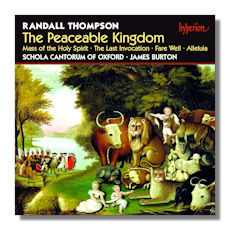
The Internet's Premier Classical Music Source
Related Links
-
Find CDs & Downloads
Amazon - UK - Germany - Canada - France - Japan
ArkivMusic - CD Universe
Find DVDs & Blu-ray
Amazon - UK - Germany - Canada - France - Japan
ArkivMusic-Video Universe
Find Scores & Sheet Music
Sheet Music Plus -
Recommended Links
Site News
Randall Thompson

(1899 - 1984)
Ira Randall Thompson (April 21, 1899 - July 9, 1984) dropped the "Ira" pretty quickly. He studied at Harvard, at the time not a particularly great place for training composers or professional musicians of any sort, most notably with Edward Burlingame Hill, and supplemented this tuition with private lessons from Ernest Bloch. Success came to him early. In the Twenties, he won an American Prix de Rome, became head of the music department at Wellesley, and got a Guggenheim Foundation grant. The latter enabled him to investigate American music education and to come up with a new approach to the curriculum. In the Thirties, he was able to put his ideas into practice at Harvard, and he became a distinguished academic, teaching at Berkeley, Curtis, Harvard, University of Virginia, and Princeton.
Thompson's idiom straddles late Romantic and the adolescence of Modernism. It resolutely sticks to tonality, and it often has great tunes, besides. The counterpoint is both masterful and modest: it doesn't call attention to itself. Thompson has explored several idioms in his own way. My favorite period comes from the Thirties, when American composers were consciously trying to create "American." Thompson respoonded with several works based on Appalachian modality, culminating in the classic choral cantata, The Peaceable Kingdom.
From the beginning, Thompson showed a remarkable talent for choral composition. In Rome, under Malipiero's guidance, he had studied the Italian masters of madrigal. It shouldn't surprise anybody that his most popular works are choral – Frostiana, Americana, The Testament of Freedom, The Last Words of David, and especially the Alleluia, all continue to be frequently performed, especially by ambitious amateurs. Thompson's choral writing works so well, it often makes a fair choir sound much better. One rarely meets a choral singer who hasn't sung at least some Randall Thompson.
Thompson, however, wrote in all genres: three very modern symphonies (of which the second – a latter-day Dvořák "New World" – I think the best), chamber music, including two wonderful string quartets, and fugitive pieces.
After World War II, Thompson's music stood under a dismissive critical cloud. It was indeed out of touch with what went on at the time, but it was also beautiful music. Thompson responded by largely withdrawing from the professional music scene and concentrated on writing for amateurs. This unfortunately resulted in many writers thinking of him as a genteel, amateur composer, unready to play in the majors. However, amateurs have kept Thompson's name and music alive. Leonard Bernstein's classic recording of the Symphony No. 2 (Sony SMK60594) prodded some writers and musicians to take another look. Thompson's stock has fluctuated ever since, and one can't currently call his non-choral work "established." He may not be as great a composer as Stravinsky, but he doesn't have to be. His music provides its own individual pleasures. ~ Steve Schwartz
Recommended Recordings
Alleluia
- Alleluia, Herbert Song 1, The Best of Rooms, Odes of Horace, Last Invocation, The Peaceable Kingdom/Arsis CD-103
-
Leo Nestor/American Repertory Singers
- Alleluia, The Peaceable Kingdom, Mass of the Holy Spirit, Last Invocation/Hyperion CDA67679
-
James Burton/Schola Cantorum Oxford














